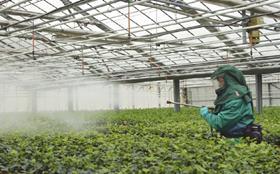
The European Crop Protection Association (ECPA) has expressed its disappointment with the European Commission’s long awaited proposal setting out criteria for endocrine disruptors.
According to the ECPA, the criteria fails to distinguish between those substances which cause actual harm and others which pose no threat to human safety.
'The safety of crop protection products – for both human health and the environment – is of primary importance to the industry which also understands the significant public interest in endocrine disruption,' the ECPA noted.
'By its own admission the Commission have not considered socio-economic impact when defining the criteria. We believe it would be counter-productive to ban substances that provide valuable benefits to farmers – which enable them to produce safe, healthy, affordable food – if that did not make any positive contribution to human health and environmental safety.'
The group said that after six years of work with input from EFSA, scientific experts and various stakeholders, the criteria are no more than the WHO/IPCS definition, developed over a decade ago – a definition the ECPA still sees as 'a sensible starting point', but not appropriate for regulatory purposes on its own.
ECPA had hoped that the Commission would take into account all available and relevant scientific information – including potency, which is one of the most important factors – when evaluating a substance for its potential endocrine-disrupting properties.
'We understand that the Commission has proposed derogations based on risk and exposure for plant protection products. Regulation by derogation is not acceptable, nor is it predictable and expanding the derogations is essentially signalling a flaw in the criteria,' the group continued. 'An unpredictable regulatory framework only increases uncertainty for product development and innovation.'
It remains the Association's view that endocrine disruptors can and should be treated like most other substances of potential concern and subject to risk assessment which considers both hazard and exposure.
Jean-Charles Bocquet, Director General of ECPA, said: “This criteria fail to distinguish between those substances which may cause actual harm and others which pose no threat to safety. In our view, this could lead to bans of crop protection products with the same endocrine disrupting properties found in every day products like coffee.
'We certainly recognise the significant public interest in this topic but believe we need a proposal that targets only those substances which cause actual harm otherwise we risk taking away tools from farmers which they need to sustainably produce our safe, healthy, affordable food,' he added.
The proposal will now be put forward for agreement by Member States and subject to scrutiny by the European Parliament and the Council of the European Union. The industry trusts that its important role in producing a safe, sustainable and affordable supply of food will be taken account of during these negotiations.



